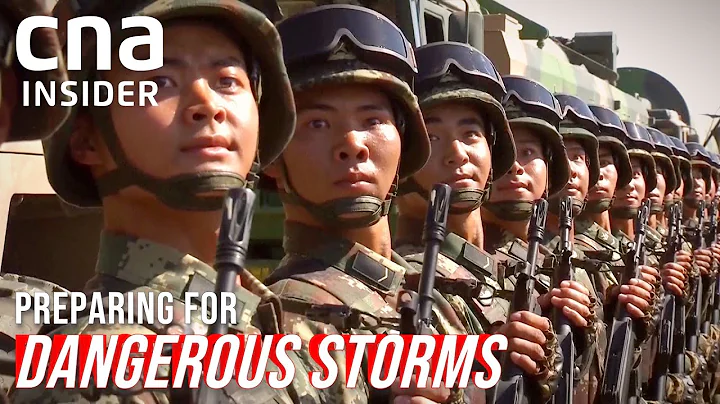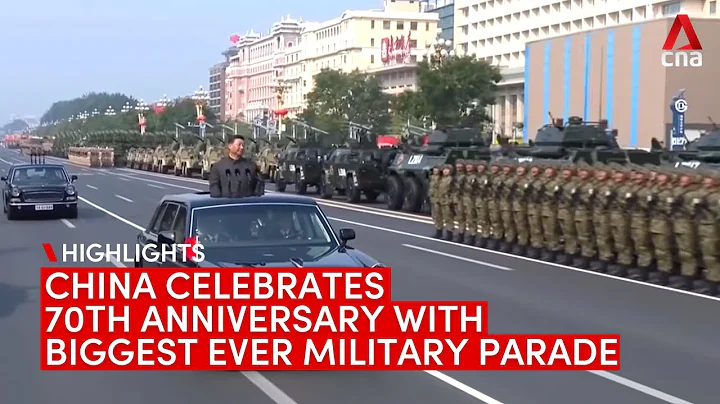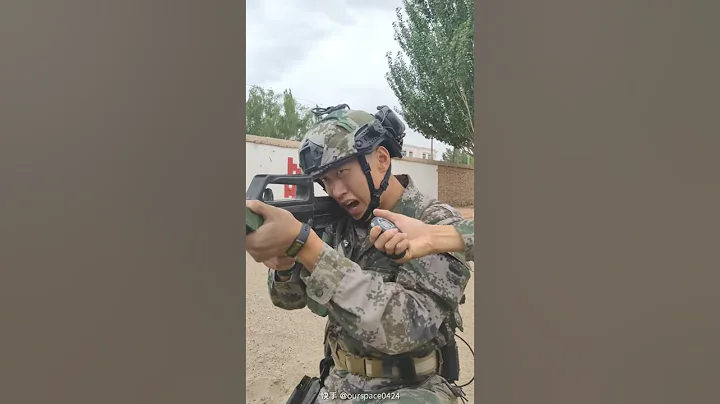After the founding of the People's Republic of China, the People's Liberation Army began modernization and regularization, and rapidly transformed from a single army system to a combined army of various services and arms. In order to adapt to this change, various military academies have been established one after another. On May 16, 1952, in order to strengthen the logistics work of the People's Liberation Army and train logistics leading cadres above the entire army corps, Chairman Mao Zedong signed an order and decided to establish the Chinese People's Liberation Army Rear Service Academy (referred to as the Logistics Academy). The order pointed out: "In order to meet the needs of national defense construction, timely train logistics cadres and strengthen logistics leadership, the Central Military Commission has decided to establish a logistics college." On June 19 of the same year, the Central Military Commission decided to establish the First Senior Infantry School (full military level, principal Peng Shaohui) and the General Logistics Advanced Logistics School merged to form the Logistics College, which is directly under the leadership of the Central Military Commission. The college is located in Beijing (the original site of the General Logistics Advanced Logistics School). Li Jukui, director of the Logistics Department and Political Commissar of the Northeast Military Region, is appointed as the dean of the Logistics College.

The address of the First Senior Infantry School (Tianshui)

General Li Jukui (awarded in 1958)
On June 22, 1952, Chairman Mao issued an order for Li Jukui to serve as the dean of the Logistics College. In late August, after Li Jukui handed over the work at hand in Shenyang, he went to Beijing to take office. After several months of hard work, in January 1953, the students' four-month preparatory study was completed, cadres and teachers were in place one after another, urgently needed teaching materials were prepared, and preliminary results were achieved in the construction of the school building. The Logistics College basically met the conditions for the opening of the school. . Therefore, on January 18, Li Jukui, on behalf of the Party Committee of the Logistics College, wrote a report to the Central Military Commission on the opening ceremony of the Logistics College to be held on February 1, and asked Chairman Mao and Commander-in-Chief Zhu to write inscriptions for the Logistics College.

On January 31, 1953, Mao Zedong, Chairman of the People’s Revolutionary Military Commission of the Central People’s Government, issued a precept to the Logistics College.
Chairman Mao's inscription is as follows:
Dean Li of the Logistics College and all the students, faculty and staff comrades:
I congratulate you on your achievements in preparatory study and teaching, and hope that you will successfully complete the study and teaching given to you by the Military Commission in the future. Task.
For the modern army, well-organized rear service work is of extremely great significance. Any view that despises logistics work and thinks that logistics work is not an important specialized science and does not require systematic study or proficiency in business is completely wrong.
We must learn from the complete logistics work construction of the Soviet army and study the status and experience of logistics work in the Korean War in order to achieve the purpose of modernizing and regularizing our army's logistics work. All teachers, staff, and students of the Logistics College should unite and strive to complete this glorious task!
Chairman Mao Zedong
January 31, 1953
Zhu De’s inscription is:
Learning from the advanced experience of the Soviet Union and establishing modern logistics work is one of the most important tasks to consolidate national defense and protect our great motherland.
Regarding the level of the Logistics College when it was established, many people think it was the level of a military region , and the first dean Li Jukui was later awarded the rank of general, so it is not the level of a large military region? This is even mentioned in some books and articles. In fact, this is not the case. In the early days of the founding of the People's Republic of China, there were very few military region-level units, and the commanders of military regions were basically marshals who later became marshals. After the military regions were redivided in 1955, generals and lieutenant generals were the chief officers of major military regions. The cadre rating of the entire army conducted in 1952, based on the cadres’ qualifications and positions, stipulates: “The corps and the second-level military region commanders and political commissars equivalent to the corps should generally be rated as full corps level, and individual unsuitable personnel should be lowered as appropriate. ." At the time of the rating, Li Jukui had already worked at the Logistics College and was rated at the deputy corps level. It was obvious that the Logistics College was not at the military region level at that time. Some people also believe that the Logistics Institute, like the Military Academy , is directly under the leadership of the Central Military Commission and should be at the level of a large military region. In fact, the General Senior Infantry School (President Song Shilun) and the Military Engineering College (President Chen Geng) established during this period were also directly under the leadership of the Central Military Commission and were also at the corps level. Moreover, it is impossible to establish a large military region organization with a military-level organization.Finally, let’s take a look at the authoritative statement of the “Organizational History Materials of the Communist Party of China and the Chinese People’s Liberation Army (Volume 4)” compiled by the Organization Department of the General Political Department (published by Long March Press in October 1995): “In July 1952, with the first senior infantry Based on the School and the Advanced Logistics School, the Rear Service College of the Chinese People's Liberation Army was established as a corps-level unit directly under the leadership of the Central Military Commission. "
In June 1955, the first batch of 400 trainees in the Logistics College spent 2 years and 8 months studying. Upon successful graduation, Peng Dehuai, He Long, Nie Rongzhen and other founding fathers came to the college in person to congratulate and attend the graduation ceremony. In the 1950s and 1960s, Mao Zedong, Liu Shaoqi, Zhou Enlai, Zhu De, Deng Xiaoping and others met with college graduates and advanced workers many times.

On January 22, 1957, Mao Zedong, Deng Xiaoping, Peng Dehuai and other leaders met with the advanced teaching staff of the Logistics College and the third batch of graduates of the accelerated department.
In 1955, our army implemented the military rank system for the first time. The military rank evaluation process began in February 1955. By July and August, the list of personnel awarded the rank of general was basically finalized and submitted to the Central Military Commission for approval. Li Jukui was rated as general. But just before the title was awarded, in August of this year, Li Jukui was appointed by Premier Zhou to serve as the first minister of the newly established Ministry of Petroleum Industry. Therefore, when conferring titles on senior generals at the end of September, Li Jukui missed the rank of general. In 1958, Li Jukui and Lieutenant General Yu Qiuli, political commissar of the General Logistics Department, were transferred and were awarded the rank of general after returning to the army.
After Li Jukui, the deans of the Logistics College were: Lieutenant General Qiu Huizuo (Deputy Minister and Deputy Political Commissar of the General Logistics Department), Lieutenant General Zhang Chiming (Deputy Minister of the General Logistics Department), Lieutenant General Zhang Tianyun (Deputy Minister of the General Logistics Department) concurrently), Major General Dai Jinchuan;
Political Commissar of the Logistics College: Lieutenant General Peng Jiaqing (deputy political commissar of the General Logistics Department and concurrently), Major General Yan Jiesan.
In July 1956, the Training Directorate of the Central Military Commission proposed in the "Opinions on the Classification of Colleges and Universities at All Levels in the Military" that military academies and schools are divided into five levels according to type and training objects: front army, group army, corps, division and regiment. . At that time, our army did not have the organic units of front armies and group armies, and the organizational levels of front armies and group armies were at the military district and corps levels.
The levels of military academies determined this time include 3 that are equivalent to the level of the front army:
Higher Military Academy (newly built), the Military Academy, and the Institute of Political Science;
there are 7 that are equivalent to the level of the group army:
Military Engineering College , Rear Service Academy, General Senior Infantry School, Naval Academy, Air Force Academy, Artillery Academy, Armored Forces Academy (the above Departments of Sea, Aircraft, Artillery, and Armored Forces are to be newly established).
In January 1957, the Rear Service College was placed under the leadership of the General Logistics Department.
In April 1960, the General Rear Service Department was renamed the General Logistics Department; at the same time, the Rear Service College was renamed the Logistics College.

Rear Service Academy graduation certificate issued by Lieutenant General Zhang Chiming and Lieutenant General Peng Jiaqing in January 1960.

The second batch of trainees from the barracks department of the Rear Service College graduated in 1961. Note that the old name of the Rear Service Service College is still used at this time.

A group photo of the third batch of students graduating from the Department of Health Service of the Logistics College in 1963
In the early days of the "Cultural Revolution", military academies were greatly affected. On February 19, 1969, the Central Military Commission approved the "Adjustment Plan for Military Colleges and Universities", reducing the number of 125 colleges and universities to 43, and 82 colleges and universities were abolished, including the Logistics College.

This is the auditorium of the Shanghai Institute of Geology in the 1975 remake of the movie "The Young Generation". It was filmed in the auditorium of the Logistics Institute, which was used by the Maritime Song and Dance Troupe at the time.
After the end of the "Cultural Revolution", everything was waiting for improvement. In order to strengthen the regularization and modernization of the people's army and improve the military and political quality of our army's officers and soldiers, the Central Military Commission decided to restore and adjust military academies. On November 7, 1977, the Central Military Commission decided to reorganize the "Logistics College of the Chinese People's Liberation Army" based on the Logistics Department of Military and Political University. The school will be located at the former site of the Logistics College in Beijing. The main task is to train logistics command and service leading cadres at all levels above the regimental logistics director and agency section chief. On December 23, the Central Military Commission appointed Chen Manyuan, a consultant to the Academy of Military Sciences, as the dean of the Logistics School, and Li Jukui as the political commissar.

Chen Manyuan, the first dean of the reconstructed Logistics Academy (at the military region level)

On January 6, 1978, the Central Military Commission approved that the Military Academy, Political Academy, and Logistics Academy implement the authority at the military region level.

On March 1, 1978, the opening ceremony of the reconstructed Logistics College

"Liberation Army Daily" on March 3, 1978
After that, Yang Xiushan (the founding lieutenant general) and Xu Fangchun successively served as deans of the Logistics College, and Cao Siming served as political commissar.

Graduation commemoration of the senior class of the Logistics College in 1981
In October 1985, the Central Military Commission proposed a strategic change in the guiding ideology of army construction and decided to merge the three major colleges of military, politics and logistics to form the National Defense University. At the same time, the School of Political Science and the School of Logistics were abolished.
On June 9, 1986, the Central Military Commission decided to establish an intermediate logistics command college at the site of the original Logistics College. It will still be named the Logistics College. It will exercise corps-level authority and be directly under the organizational leadership of the General Logistics Department. Li Lun, director of the Military Transportation Department of the General Logistics Department (son of the founding general Li Kenong), was appointed as the dean of the Logistics College. At that time, the Logistics College was short of political commissars.

Lieutenant General Li Lun, dean of the newly established Logistics College (corps level)
In June 1989, Lieutenant General Li Lun was transferred to deputy minister of the General Logistics Department, Lieutenant General Yang Faxun was appointed as the dean of the Logistics College, and Lieutenant General Xu Sheng was appointed as political commissar. In April 1990, Xu Sheng was transferred to the position of deputy political commissar of the General Logistics Department, and Lieutenant General Zhang Chao succeeded him as political commissar of the Logistics College.
 htmlThe Logistics College in the early 1990s
htmlThe Logistics College in the early 1990s
In order to implement the military strategic guidelines of the new era and adapt to the situation of adjusting and streamlining the organizational structure of our military, in September 1992, the Central Military Commission issued the "Reform Plan for the Adjustment and Reform of the Institutional Establishment of the Military Academy", and the Logistics College was abolished again.

Logistics College and Logistics Command College emblem
In early 1993, with the adjustment of our military's military strategic policy in the new era, the Central Military Commission decided to restore the Logistics College as an intermediate command college and renamed it the Logistics Command College. It was affiliated with the General Logistics Department and exercised its normal functions. Military level authority. In January 1993, Chairman Jiang Zemin inscribed the name of the college. Major General Xu Genchu, deputy chief of staff of the General Logistics Department Headquarters, serves as the dean of the Logistics Command College, and Major General Lu Guangzu, commander of the Base Command of the General Logistics Department , serves as the political commissar of the Logistics Command College. Since then, the president and political commissar of the hospital have been major generals.

Commemorating the 50th anniversary of the establishment of the Logistics Command College (Logistics College)
In September 2011, President Hu Jintao issued an order: the Logistics Command College was renamed the Chinese People's Liberation Army Logistics College.

The renamed Logistics College

The 60th anniversary of the founding of the Logistics College
In January 2016, in the new round of military reform, the Central Military Commission headquarters system was adjusted to the Military Commission multi-departmental system. Subsequently, the Logistics College was transferred to the newly established Training and Management Department of the Central Military Commission.
In July 2017, the Logistics College was renamed Chinese People’s Liberation Army National Defense University Joint Service College, which was at the deputy military level and merged into the National Defense University.

On September 28, 2017, the reorganized Joint Service College of the National Defense University held a flag-raising ceremony.
Since its establishment 70 years ago, the Logistics College has trained more than 100,000 logistics command talents, of which more than 400 have become generals. During this period, has been canceled three times, rebuilt three times, changed its name three times, downgraded three times, and changed its affiliation five times... The only thing that has not changed is the location of the hospital.






















